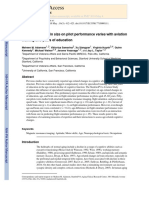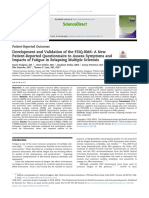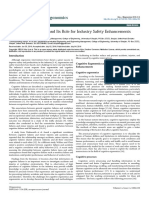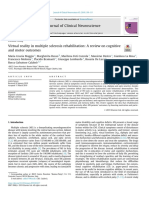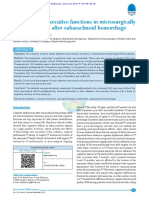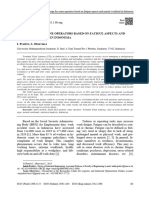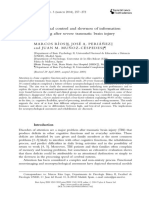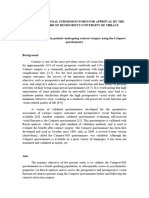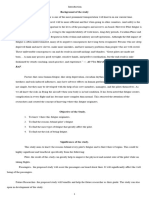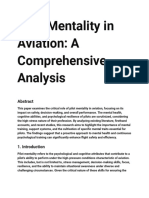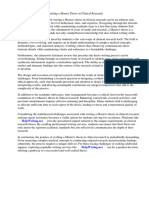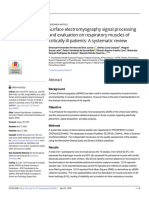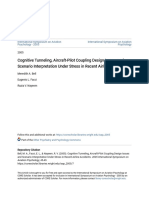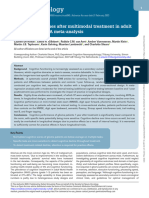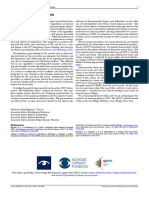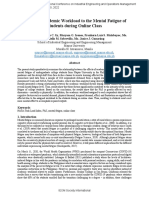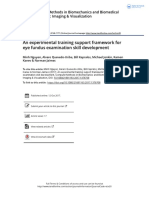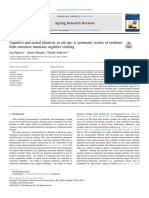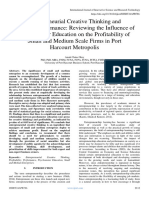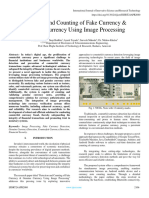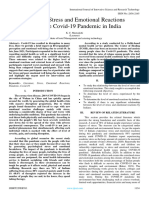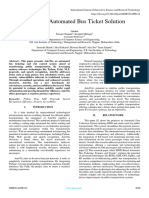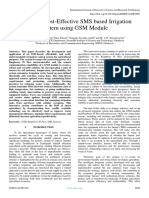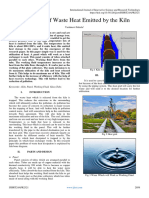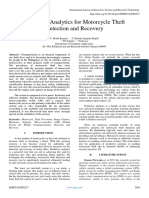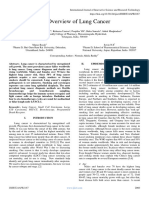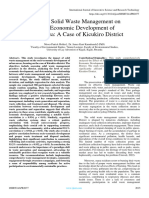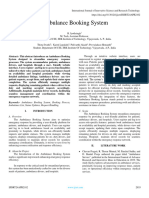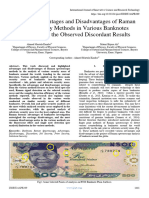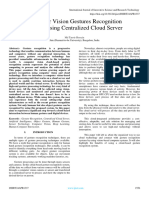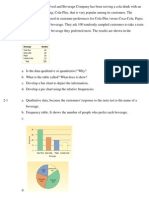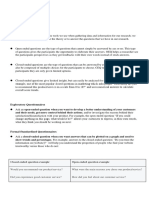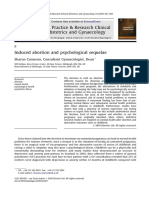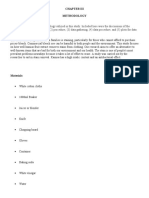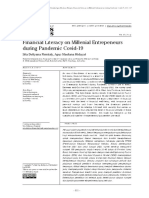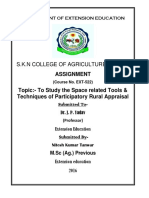Professional Documents
Culture Documents
Post-Treatment Effects of Multiple Sclerosis (MS) On The Executive and Memory Functions Ofcommercial Pilots in The UAE
Original Title
Copyright
Available Formats
Share this document
Did you find this document useful?
Is this content inappropriate?
Report this DocumentCopyright:
Available Formats
Post-Treatment Effects of Multiple Sclerosis (MS) On The Executive and Memory Functions Ofcommercial Pilots in The UAE
Copyright:
Available Formats
Volume 9, Issue 3, March – 2024 International Journal of Innovative Science and Research Technology
ISSN No:-2456-2165 https://doi.org/10.38124/ijisrt/IJISRT24MAR1666
Post-Treatment Effects of
Multiple Sclerosis (MS) on the Executive and
Memory Functions of Commercial Pilots in the UAE
Saima Muhammed Nawaz & Nuzhat Nawaz
Abstract:- Individuals with MS often face challenges in conditions could significantly contribute valuable insights
cognitive functioning, particularly in demanding towards promoting safety when navigating through
occupations such as commercial flying. This study challenging skies. Therefore, the researcher considered
investigates the post-treatment impact of MS on the assessing the pilot on the aspects of memory and executive
memory and executive functions of commercial pilots functions on a biannual basis. This research seeks four
while working under a busy flying roster. The research reassessment intervals at various times throughout those two
aims to understand cognitive changes over time and their years, wherein psychometric assessments will provide more
implications for onboard safety. Data was collected over information about possible trends or declines that shed light
two and a half years from a single pilot. Standard on this intersection between multiple sclerosis's impact upon
assessments were used to evaluate the pilot’s executive and both occupational roles as well asairspace security concerns
memory functions. A two-way ANOVA table was used for related to it.
statisticalanalysis. The analysis indicates that there is no
significant decline in performance over time for the pilot A. Research Questions
(p = 0.106447, df = 3). However, there are notable
variations among memory and executive function tasks (p How do memory and executive functions change over
< 0.001, df = 7), highlighting specific areas of strength. time in a commercial pilot with ahistory of Multiple
The null hypothesis there is no decline in pilots’ Sclerosis after undergoing treatment?
neurocognitive functions, has been accepted. Are there observable trends or declines in specific
Additionally, the case study outcomes showed cognitive domains relevant to thedemands of flying.
improvement in the pilot's executive and memory
functions over two and a half years while maintaining B. Objectives:
stressful long-haul flight rosters. Future research should
focus on understanding the factors driving these To examine the post-treatment impact of Multiple
variations and exploring interventions to address Sclerosis MS on pilots’ memory and executive functions
cognitive weaknesses. To find any potential trends or declines in specific
cognitive domains crucial for the pilot's job
Keywords:- Multiple Sclerosis, Cognitive Function, Memory, responsibilities.
Executive Function,Commercial Pilots, Aviation Safety.
C. Problem Statement:
I. INTRODUCTION Despite receiving treatment, commercial pilots with a
history of Multiple Sclerosis may face persistent challenges
Individuals with Multiple Sclerosis (MS) face unique in memory and executive functions, potentially impacting
challenges in various aspects of their lives, including their performance and safety on board. Understanding the
commercial pilots who work in the demanding field of lasting effects of the disease on cognitive abilities is essential
aviation. Due to the complex cognitive demands needed for for developing proper interventions and ensuring continued
flying, it is crucial to understand the trajectory of cognitive safety.
functionsamong people diagnosed with MS. This study aims
to investigate how MS impacts memory and executive II. LITERATURE REVIEW
functions on long-term neuropsychological profiles post-
treatment, specifically within commercial pilots. Initial post- MS is a multifaceted autoimmune illness that
treatment results show that the pilot's executive and memory specifically impacts the central nervous system and createsan
functionswere working within the normal range of his age array of neurological symptoms. The current study will explore
group. However, researchers do not have baseline data for the the impact of MS on commercial pilots’cognitive functions. In
pilot to prove the trends if there is any decline, and how multiple sclerosis, the immune system wrongly targets myelin
unpredictable and dynamic disease progression can be over - which safeguards the nerve fibers. Consequently, this
time. Moreover, the aviation industry requires maximum disrupts communication between the brain and other body
performance under high-pressure situations, so understanding parts, resulting in varied symptoms that range from tiredness
if there are any progressive or new implications from these and mobility complications to cognitive difficulties,as well as
IJISRT24MAR1666 www.ijisrt.com 2536
Volume 9, Issue 3, March – 2024 International Journal of Innovative Science and Research Technology
ISSN No:-2456-2165 https://doi.org/10.38124/ijisrt/IJISRT24MAR1666
sensory disturbances. Despite the well-documented physical (Denney et al., 2008). Amato et al. research also provided
symptoms of MS, cognitive difficulties play a significant role similar outcomes over the course of three years. They
in this disease and are often overlooked. Those living with predicted that around one-third of patients withrelatively short
MS often struggle with aspects such as memory retention, disease duration would experience such deterioration in this
attention span, processing speed of information intake, and time and found SDMT as the best tool for measuring
executive functions. These challenges can vary greatly from longitudinal changes in cognition related to MS. Furthermore,
person to person, which contributes significantly to their their findings showed that initial moderate impairment was
individual experiences dealing with multiple sclerosis. In the predictive of further decrease and T2 lesion volume had
case of pilots, flying requires technical knowledge but also limited correlation with certain cognitive tasks (Amato et al.,
needs sharp cognitive skills to deal with complex and 2010).
challenging situations on board. This review delves into the
extensive literature on the cognitive demands of the aviation However, Glanz et al. (2011) examined individuals who
industry, emphasizing the significant findings from studies had early onset MS and discovered that their working memory
that investigate pilots' mental workload, attentional as well as visual spatial memory diminished while verbal
requirements, and cognitive processing capabilities. These memory remained unaffected. Additionally, more serious
insights provide a foundational understanding of the intricate cognitive impairments were linked to heightened disease
and multifaceted challenges within the cockpit. This study severity and an augmented possibility of relapse according to
investigates how environmental factors, such as task the same study by Glanz et al. (2011). In their 2014 research,
complexity and rapidly advancing technology, impact Parisi and colleagues analyzed the effects of cognitive
cognitive functioning in aviation. Understanding these rehabilitation on resting-state functional connectivity in
intricate demands on cognition is essential for fully multiple sclerosis (MS) patients. The study revealed that such
appreciating the potential implications for safe flying, therapy led to notable enhancements in attention, executive
especially concerning conditions such as MultipleSclerosis. function, quality of life, and depression levels among
participants.Furthermore, changes in resting-state functional
A. Relevant Studies connectivity were identified as significant predictors for
Initial studies were conducted on MS by Feinstein on improved mental health outcomes and cognitive performance
clinically isolated lesions associated with MS and detected post-rehabilitation according to Parisi et al. Borghi and
attention deficits during the first assessment that persisted in colleagues (2016) conducted longitudinal research for two
individuals classified as having such a lesion status. The years on neuropsychological abilities among sizeable groups
research also highlighted how patients who progressed to of people with MS, finding tasks such as SDMT, PASAT, and
clinicallydefinite MS developed memory impairments while WLG particularly sensitive to this disease’s implications
those with chronic progressive symptoms experienced while presenting general mental impairment among sufferers
significant declines specifically in auditory attention tasks. significantly worse than healthy controls who showed less
The outcomes showed the interplay of organic, psychological, drastic deterioration over time.
and social factors behind intellectual and emotional
deteriorationrelated to this disease (Feinstein et al., 1992). B. Cognitive Reserve Theory in the Context of Multiple
Similarly, the study was conducted by Piras and colleagues Sclerosis and Aviation
(2003) on cognitive dysfunction in individuals with MS. The The application of Cognitive Reserve Theory is crucial
findings showed mild impairment of attention as well as to understanding how cognitive functioning in professions
short-term and long-term visuospatial memory at the like commercial pilots is affected by multiple sclerosis (MS).
beginning of the study. All these impairments persisted According to this theory, disparities among individuals'
longitudinally without change. According to this research, cognitive reserves decide their ability to endure neurological
disease peculiarity might play a more significant role than the damage. Theliterature review on cognitive challenges in MS
time course of cognitive dysfunction in MS patients since highlights the significance of several aspects such as memory
increased MRI lesions did not correlate with either clinical retention, attention span, processing speed, and executive
outcomes or the progression of cognitive deficits (Piras et al., functions. This theory is notable for considering individual
2003). Moreover, Macallister et al. (2007) conducted astudy differences in cognitive abilities by emphasizing the impact
on cognitive decline in pediatric MS patients over time and of cognitive reserve beyond physical symptoms caused due
found that several experienced further deterioration. The to multiple sclerosis. Moreover, Cognitive Reserve
severity of neurologic disability at the start was significantly Theory’s paradigms prove useful when dealing with
related to changes seen in cognition, emphasizing its commercial pilots' unique mental abilities required for safe
importance during assessments (Macallister et al., 2007).In flight operations that conform to established standards. In
2008, Denney and his colleagues conducted a longitudinal addition, our comprehensive research examines mental
investigation spanning three years that explored cognitive workload demands on a pilot's focus levels and information-
impairment within primary progressive MS patients. Their processing ability which are integral while illuminating
findings suggested thatover the course of those three years, complex requirements within airline cockpits. The concept of
MS sufferers experienced far greater declines in processing cognitive reserve plays a key role in how individuals with
speed performance compared to control participants. This multiple sclerosis (MS) cope with their cognitive limitations.
evidence substantiated earlier claims suggesting information Individuals who have higher levels of this reserve show a
processing velocity was the domain most susceptible to long- greater ability to adapt and overcome MS-related obstacles,
term detrimental effects from this neurological condition using various coping strategies that can explain differences
IJISRT24MAR1666 www.ijisrt.com 2537
Volume 9, Issue 3, March – 2024 International Journal of Innovative Science and Research Technology
ISSN No:-2456-2165 https://doi.org/10.38124/ijisrt/IJISRT24MAR1666
between experiences among people such as pilots. addition, there is a gap in knowledge due to conflicting
Understanding the level of cognitive reserve had by those findings on the impact of MS treatment on cognitive function.
affected by MS is vital for predicting potential outcomes While someresearch shows minimal effects, little attention
related to advancing symptoms, particularly for professions has been paid to investigating the post-treatment period for
requiring challenging mental tasks like commercial pilots. commercial pilots with MS. Understanding how treatment
Through synthesizing Cognitive Reserve Theory and existing affects their cognitive decline is vital for developing
literature on this topic, it becomes clear that these challenges interventions and keeping safety standards within this
are unique based on individual factors experienced by demanding occupation. In addition, the field of commercial
persons living with MS - offering key insights into onboard aviation has a significant research gap that needs to be
safety measures around brain-intensive duties involving addressed - specifically regarding pilots with Multiple
cockpit-related complications where pilot performance may Sclerosis (MS). While cognitive decline can affect job
be affected overall. Ultimately though we see here The performance, limited studies have been conducted on the
Cognitive Reserve Theory offers us a valuable framework challenges faced by MS-diagnosed pilots. Researchers must
towards understanding better how both neurological fill this void and develop interventions tailored towards
difficulties caused from illness interact alongside demanding meeting their unique needs. Doing so will promote better
careers within commercial pilots. cognitive health among commercial pilots and ensure safety
in aviation operations. Furthermore, there is a deficiency in
C. Significance of the Current Study the existing literature about the investigation of memory and
Although the current research provides valuable executive functions simultaneously. Despite individual
knowledge on how Multiple Sclerosis (MS) affects cognition, studies focusing on these cognitive aspects, thereis an absence
there remains a clear gap in the literature when it comes to of comprehensive research that considers both components
commercial pilots. Even though several studies have concurrently. The proposed research question specifically
examined the cognitive implications of MS, very few focus addresses this gap by emphasizing the simultaneous
specifically on memoryand executive functions among this examination of memory and executive functions among
group over extended periods. The skill set needed for commercial pilots with MS. By taking this approach, the
commercial piloting is distinct; therefore, exploring the researcher aims to provide a more well-rounded
details of cognitive decline as related to occupational context comprehension of cognitive decline within this population. In
has been under-investigated thus far. Additionally, the current brief, while earlier research has made important paces in
studies often neglect to investigate memory and executive understanding cognitive decline associated with MS, the
functions in MS patients longitudinally. Despite some found gaps highlight the need for added investigation -
informative findings, there is a shortage of research that particularly when it comes to commercial pilots. Filling these
comprehensively examines the enduring effects on cognitive gaps is not only crucial for improving our knowledge of how
abilities such as memory and executive functions. These MS affects cognition but also offers essential insights into
void underlines the necessity for investigations that track developing targeted interventions and maintaining safety
cognitive variations over a prolonged duration thereby standards within demanding occupations such as commercial
offering more intricate insights into the progression of MS- flying.
linked mental deterioration among commercial pilots.In
Fig 1: Theoretical Framework
IJISRT24MAR1666 www.ijisrt.com 2538
Volume 9, Issue 3, March – 2024 International Journal of Innovative Science and Research Technology
ISSN No:-2456-2165 https://doi.org/10.38124/ijisrt/IJISRT24MAR1666
III. RESEARCH METHODOLOGY Definition:
In this chapter, the researcher will discuss the research - The cognitive ability related to the retention and recall of
method, including hypotheses, variables,population, sample information.
size, data collecting tools, and data analysis methods. - Assessed through standardized memory tests.
A. Research Hypothesis: Executive Function
H0: There is no significant decline in either memory or Definition
executive functions in commercial pilotswith a history of
MS after undergoing treatment.
- Cognitive processes responsible for planning, organizing,
H1: There is a significant decline in both memory and
starting, and completing tasks.
executive functions in commercial pilots witha history of
MS after undergoing treatment. - Assessed through standardized executive function tests.
B. Variables and Definitions C. Procedure:
The study aimed to investigate how post-treatment
Independent Variables: affects commercial pilots with a history of Multiple Sclerosis.
They selected one pilot on purpose, choosing someone with
Time Definition: specific characteristics important to the study. They used
standardized tests like the D-KEFS and WMS to measure
The duration elapsed since the pilots' completion of memory and thinking skills. These tests were done every 6
Multiple Sclerosis treatment. months after treatment. A certified psychologist conducted
Measured in months from the completion of treatment. each assessment.
D. Data Analysis:
Dependent Variables:
The data was collected in quantitative form. For
statistical analysis, ANOVA Table repeatedmeasure was used.
Memory Function:
Anova
Table 1: Two-Factor without Replication Post Treatment MS
ANOVA: Two-Factor Without Replication
SUMMARY Count Sum Average Variance
1 8 527 65.875 1876.125
2 8 524 65.5 1855.714286
3 8 539 67.375 1905.410714
4 8 540 67.5 1890.285714
AM 4 377 94.25 31.58333333
VM 4 396 99 0
VWM 4 396 99 0
DM 4 394 98.5 0.333333333
IM 4 396 99 0
VS 4 60 15 1.333333333
IH 4 57 14.25 0.25
MS 4 54 13.5 0.333333333
E. Description of Abbreviation in Table assessments. There was an improvementfrom the first to the
Auditory Memory (AM), Visual Memory(VM), third evaluation followed by a slight decline in the fourth
Visional Working Memory(VWM), Delayed assessment, but overall, the results remained stable. The
Memory(DM), Immediate Memory(IM) ,Visual variability of each score fluctuated significantly, peaking
Scanning(VS) , Inhibition(IH) ,Motor Speed.(MS). during the third examination session. During the evaluation
of various memory and executive function tasks, differences
In a series of four evaluations, a single patient diagnosed in the patient's performance were observed. They showed
with Multiple Sclerosis (MS) consistently showed stable higher ability in completing AM (average score of 94.25)
performance in memory and executive function tasks. The compared to MS (average score of 13.5). However, within
patient'saverage scores ranged from 65.875 to 67.5 across all each task category, the patient's performance showed low
IJISRT24MAR1666 www.ijisrt.com 2539
Volume 9, Issue 3, March – 2024 International Journal of Innovative Science and Research Technology
ISSN No:-2456-2165 https://doi.org/10.38124/ijisrt/IJISRT24MAR1666
variability overall. within each task category, although certain tasks showed
superior results compared to others. Further comprehensive
Overall pilot with MS showed consistent cognitive examination alongside control groups could provide a deeper
performance across the different evaluations with some understanding of the patient's cognitive abilities.
fluctuations in specific tasks. Overall stability was observed
Anova
Table 2: Results of Post Treatment MS Pilots on Multiple Assessments
ANOVA
Source of Variation SS Df MS F P-value F crit
Rows 25.125 3 8.375 2.302782324 0.106447 3.072467
Columns 52616.38 7 7516.625 2066.764321 0 2.487578
Error 76.375 21 3.636904762
Total 52717.88 31
The ANOVA table presents the results of a statistical LIMITATIONS OF THE STUDY
analysis comparing the performance of post-treatment pilots
with Multiple Sclerosis (MS) across multiple assessments. Single-Participant Design: The study's narrow scope
The table includes the sum of squares (SS), degrees of which involved a single pilot for two and a half years
freedom (Df), mean squares (MS), F-statistic (F), p-value, could constrain the applicability of its results. A broader
and critical F-value (F crit) for the rows and columns factors. representation of pilots with Multiple Sclerosis (MS)
For the rows factor, the p-value is 0.1064, which is greater encompassing greater diversity in numbers and
than the typical significance level of 0.05. This suggests that demographics would yield more correct insights into
there is no significant difference between the groups cognitive patterns within this group.
represented by the rows factor. For the columns factor, thep- Duration of Study: Although the study covered two and a
valueis 0, indicating a significant difference between the half years this may not have fully captured the diverse
groups represented by the columns factor. In conclusion, the range of cognitive changes in MS patients due to
results indicate that there is a significant difference between infrequent assessments and limited time points. To gain a
the groups represented by the columns factor, but not the rows more detailed comprehension of cognitive trajectories
factor. over extended periods, conducting a longer-term study
with increased assessment frequency would be beneficial.
IV. CONCLUSION Potential Confounding Factors: Future studies should aim
to control for all potential confounding variables that
Analyzing the ANOVA results for a single patient could affect cognitive function, like medication use,
across four assessments provides valuable insights intotheir comorbidities, or lifestyle choices, since this study may
cognitive performance. The variability observed among the have overlooked some of them. Doing so will improve the
assessments (rows) showed a p-value of 0.106447, indicating reliability and validity of any findings in future research.
that there is not enough evidence to reject the null hypothesis.
This suggests that there is no significant difference in FURTHER RESEARCH
performance between the assessments, and thus, the null
hypothesis (H0) stating "There is no significant decline in Longitudinal Studies with Larger Samples: To enhance
either memory or executive functions in commercial pilots comprehension of the developmental pattern ofcognitive
witha history of MS after undergoing treatment" is accepted. impairment in pilots with MS, future investigations must
undertake longitudinal research using bigger pilot
In contrast, when examining the variance among populations. Analyzing diverse subjects will help an
different memory types and executive function tasks inspection of distinctive variances and subdivision
(columns), a p-value of zero was obtained, indicating evaluations.
statistical significance. This suggests that there are notable Diverse Participant Populations: By studying pilots with
differences in task types that affect the patient's overall MS from diverse backgrounds and demographics,
cognition level, and therefore, the null hypothesis (H0) for the researchers could gain a more complete understanding of
columns factor is rejected. Overall, the patient's performance the effects that this disease has on cognitive function. A
remains stable acrossall four assessments. However, there are thorough investigation would entail enlisting participants
noticeable differences between various memory and who show varied levelsof illness severity, time afflicted by
executive function tasks. Based on the data presented, we the condition, as well as their past treatment histories.
confirm that there is no significant decline in either memoryor Comprehensive Cognitive Assessments: An extensive
executive functions in commercial pilots with a history of MS array of cognitive assessments that encompassesa range of
after undergoing treatment, supporting the acceptance of the cognitive domains would yield a more comprehensive
null hypothesis (H0). evaluation of the pilots' cognitive abilities who suffer from
IJISRT24MAR1666 www.ijisrt.com 2540
Volume 9, Issue 3, March – 2024 International Journal of Innovative Science and Research Technology
ISSN No:-2456-2165 https://doi.org/10.38124/ijisrt/IJISRT24MAR1666
MS. Such evaluations may form tests centered on memory, [9]. Johnen, A., Landmeyer, N. C., Bürkner, P. C., Wiendl,
attention, processingspeed, and executive function. H., Meuth, S. G., & Holling, H. (2019). The impact of
Exploration of Protective Factors: Valuable research perceived stress and resilience on self-assessed
would investigate potential protective factors or neuropathy: a cross-sectional study of 2,500 patients
interventions that can reduce cognitive decline among with neurologic diseases. Journal of Neurology,
pilots with MS. This could include assessing the benefits 266(9), 2186-2194.
of lifestyle changes, cognitive training programs, and [10]. MacAllister, W. S., Christodoulou, C., Troxell, R.,
pharmacological treatments focused on maintaining Milazzo, M., Block, P., Preston, T. E., ... &Belman, A.
mental function. (2009). Fatigue and quality of life in pediatric
Validation Studies: To increase the dependability and multiple sclerosis. MultipleSclerosis Journal, 15(12),
applicability of results, it is recommended to confirm 1502-1508.
outcomes from pilot studies with bigger cohorts or [11]. Paris, A. P., Saenger, V. M., Beekman, R., Van, G. P.,
replication research. Joint endeavors between aviation Polman, C. H., Benedict, R. H., ... & Rudick, R. A.
organizations and analysis establishments could aid in (2011). Exploring the basis for demographic
enlisting larger samples as well as executing multicenter differences in a large sample ofpatients with multiple
investigation. sclerosis. Archives of Neurology, 68(12), 1542-1547.
[12]. Rosti-Otajärvi, E., Hämäläinen, P., Koivisto, K., &
REFERENCES Hokkanen, L. (2013). The reliability of the Finnish
version of the Modified Fatigue Impact Scale and the
[1]. Achiron, A., Barak, Y., Dolev, M., Gabbay, U., Harel, self and physician rated FSS in multiple sclerosis.
Y., Stern, Y., & Elizur, A. (2005). Cognitive patterns Multiple Sclerosis Journal, 19(1), 134-136.
and progression in multiple sclerosis: construction and [13]. Rund, B. R., Melle, I., Friis, S., Larsen, T. K., Midbøe,
validation of percentile curves. Journal of Neurology L. J., Opjordsmoen, S., ... & Simonsen,
Neurosurgery & Psychiatry, 76(5), 744-749. [14]. E. (2016). Neurocognitive dysfunction in first-
[2]. Azuma, T., Cruz, R. F., Bayles, K. A., Tomoeda, C. episode psychosis: correlates with symptoms,
K., Montgomery, E. B., & Wiitala, H. E. (2003). A premorbid adjustment, and duration of untreated
longitudinal study of neuropsychological change in psychosis. Psychiatry Research, 236, 119-125.
individuals with Parkinson's disease. International [15]. Sá, M. J., Madeira, P., Vaz‐Silva, M., Honrado, T., &
Journal of Geriatric Psychiatry, 18(12), 1115-1120. Palavra, F. (2003). The effect of comorbidities on
[3]. Borghi, M., Cavallo, M., Carletto, S., Ostacoli, L., multiple sclerosis adherence: A nationwide
Zuffranieri, M., Picci, R. L., ... & Pagani, M.(2016). population‐based cohort study. Multiple Sclerosis
Decline of neuropsychological abilities in a large Journal, 9(6), 585-592.
sample of patients with multiplesclerosis: A two-year [16]. Sacco, R., Santangelo, G., Stamenova, S., Bisecco, A.,
longitudinal study. Frontiers in Human Neuroscience, Bonavita, S., Lavorgna, L., ... & Trojsi,
10, 282. [17]. F. (2016). Psychometric properties and validity of Beck
[4]. Charvet, L. E., Beekman, R., Amadiume, N., Belman, Depression Inventory II in multiplesclerosis. European
A. L., Krupp, L. B., & Group, T. U. S. P. Journal of Neurology, 23(4), 744-750.
[5]. M. S. (2014). The longitudinal impact of cognitive [18]. Stojanovic-Radic, J., Dackovic, J., Pilipovic-
fatigue in pediatric multiple sclerosis:Results of a two- Spasojic, N., Vasic, K., & Mesaros, S. (2016).
year study. Multiple Sclerosis Journal, 20(13), 1706- Quality of life and depressive symptoms in the first
1713. stages of multiple sclerosis: a 2-year longitudinal
[6]. Christodoulou, C., Melville, P., Scherl, W. F., [19]. Stojanovic-Radic, J., Dackovic, J., Pilipovic-
MacAllister, W. S., Elkins, L. E., Krupp, L. B., & US Spasojic, N., Vasic, K., & Mesaros, S. (2016).
Pediatric Multiple Sclerosis Network. (2006). Quality of life and depressive symptoms in the first
Negative affect predicts subsequent cognitive change stages of multiple sclerosis: a 2-year longitudinal
in pediatric multiple sclerosis. Neurology, 67(11), study. Acta Neurologica Belgica, 116(3), 143-147.
2080-2086. [20]. Van Schependom, J., Guldolf, K., D'hooghe, M. B.,
[7]. Glanz, B. I., Holland, C. M., Gauthier, S. A., Amunwa, Nagels, G., & D'haeseleer, M. (2014). Cerebral
E. L., Liptak, Z., Houtchens, M. K., ... & Weiner, H. L. hypoperfusion: a new pathophysiologic concept in
(2007). Cognitive dysfunction in patients with multiple sclerosis? Journal ofCerebral Blood Flow &
clinically isolated syndromes or newly diagnosed Metabolism, 34(6), 895-904
multiple sclerosis. Multiple Sclerosis Journal, 13(8), [21]. Hoogervorst, E., et al. (2002). A study confirming
1004-1010. changes in the Multiple Sclerosis Functional
[8]. Janssens, A. C., van Doorn, P. A., de Boer, J. B., Composite. Archives of Neurology, 47
Kalkers, N. F., van der Meché, F. G., Passchier,J., ... [22]. Amato, M., et al. (2010). Relevance of cognitive
& Hintzen, R. Q. (2003). Anxiety and depression deterioration in early relapsing-remitting MS:a 3-year
influence the relation between disability status and follow-up study. Multiple Sclerosis, 173 citations,
quality of life in multiple sclerosis. Multiple Sclerosis DOI.
Journal, 9(4),397-403.
IJISRT24MAR1666 www.ijisrt.com 2541
Volume 9, Issue 3, March – 2024 International Journal of Innovative Science and Research Technology
ISSN No:-2456-2165 https://doi.org/10.38124/ijisrt/IJISRT24MAR1666
[23]. Garcia-Martin, E., et al. (2013). Neuro-
ophthalmologic evaluation, quality of life, and
functional disability in patients with MS. Neurology,
63 citations, DOI.
[24]. Freeman, J., et al. (1999). Inpatient rehabilitation in
multiple sclerosis. Neurology, 118citations, DOI.
[25]. Denney, D. R., et al. (2008). A 3-year longitudinal
study of cognitive impairment in patients with
primary progressive multiple sclerosis: Speed
matters. Journal of the NeurologicalSciences, DOI.
[26]. Sweeney, J. A., et al. (1991). Evaluation of the stability
of neuropsychological functioning afteracute episodes
of schizophrenia: One-year followup study.
Psychiatry Research, DOI.
[27]. Piras, M., et al. (2003). Longitudinal study of
cognitive dysfunction in multiple sclerosis:
neuropsychological, neuroradiological, and
neurophysiological findings. Journal of Neurology
Neurosurgery & Psychiatry, DOI.
[28]. Feinstein, A., et al. (1992). Clinically isolated lesions
of the type seen in multiple sclerosis: a cognitive,
psychiatric, and MRI follow-up study. Journal of
Neurology Neurosurgery &Psychiatry, DOI.
[29]. Johnen, A., et al. (2018). Can we predict cognitive
decline after first diagnosis of multiple? sclerosis?
Results from the German National early MS cohort
(KKNMS). Journal ofNeurology, 20 citations, DOI.
IJISRT24MAR1666 www.ijisrt.com 2542
You might also like
- SPPU University SIP Project For MarketingDocument71 pagesSPPU University SIP Project For MarketingNILESH DABARE100% (1)
- Utilizing LGPMS InformationDocument13 pagesUtilizing LGPMS InformationRonz RoganNo ratings yet
- Kalia CA 6 4Document7 pagesKalia CA 6 4Sonal KaliaNo ratings yet
- NIH Public Access: Author ManuscriptDocument22 pagesNIH Public Access: Author ManuscriptAviation MedicineNo ratings yet
- Discussion PostDocument2 pagesDiscussion PostSonal KaliaNo ratings yet
- The Role of Using Concussion Detection Sensors in Healthcare ManagementDocument8 pagesThe Role of Using Concussion Detection Sensors in Healthcare ManagementengmfowziNo ratings yet
- Review ArticleDocument13 pagesReview Articleerfan khanNo ratings yet
- REvisión Sistemática Sobre Bicams 2020Document20 pagesREvisión Sistemática Sobre Bicams 2020juanpaNo ratings yet
- Development and Validation of The FSIQ-RMS A New PDocument14 pagesDevelopment and Validation of The FSIQ-RMS A New Psda asfNo ratings yet
- ACR o noACRDocument10 pagesACR o noACRNancy OlguínNo ratings yet
- Cognitive Ergonomics and Its Role For Industry Safety Enhancements 2165 7556 1000e158Document3 pagesCognitive Ergonomics and Its Role For Industry Safety Enhancements 2165 7556 1000e158Sutris YandriNo ratings yet
- Maggio 2019Document6 pagesMaggio 2019Nacho MicheloniNo ratings yet
- Thesis IteeDocument5 pagesThesis Iteejessicahillknoxville100% (2)
- An Example From The Sport of OrienteeringDocument20 pagesAn Example From The Sport of OrienteeringSavio SoaresNo ratings yet
- Detection of Cognitive Impairment in Multiple Sclerosis Based On P300 Event-Related PotentialDocument8 pagesDetection of Cognitive Impairment in Multiple Sclerosis Based On P300 Event-Related Potentialzwecker4458No ratings yet
- Attention and Executive Functions in Microsurgically Treated Patients After Subarachnoid HemorrhageDocument6 pagesAttention and Executive Functions in Microsurgically Treated Patients After Subarachnoid HemorrhageDURRAH FARARESANo ratings yet
- Investigating The Relationship Between Aptitude and Behavioral Challenges Among Air Traffic Controller Students of Abu Dhabi Navigation Service (UAE)Document9 pagesInvestigating The Relationship Between Aptitude and Behavioral Challenges Among Air Traffic Controller Students of Abu Dhabi Navigation Service (UAE)International Journal of Innovative Science and Research TechnologyNo ratings yet
- Job Design For Crane Operators Based On Fatigue AsDocument12 pagesJob Design For Crane Operators Based On Fatigue As20-156 Rifka Aloyina Br TariganNo ratings yet
- 1-cao-VR Applications in RehabilitationDocument8 pages1-cao-VR Applications in RehabilitationDuru ÇelenoğluNo ratings yet
- Aprendizaje SensoriomotorDocument7 pagesAprendizaje SensoriomotorAngelesNo ratings yet
- 2004-Brain Injury-Rios Et AlDocument16 pages2004-Brain Injury-Rios Et AlMarta SanchezNo ratings yet
- Effects of Surgery On Neurocognitive Function in Patients With GliomaDocument16 pagesEffects of Surgery On Neurocognitive Function in Patients With GliomaManuel Guerrero GómezNo ratings yet
- Thesis UjDocument7 pagesThesis Ujiinlutvff100% (2)
- Milmed D 01 5008Document5 pagesMilmed D 01 5008theinhtitesoe133No ratings yet
- Journal Pone 0278683 s003Document5 pagesJournal Pone 0278683 s003bismarkob47No ratings yet
- Aviaton Research 1Document7 pagesAviaton Research 1Jass OnteNo ratings yet
- Early Prefrontal Activation As A Mechanism To Prevent Forgetting in The Context of InterferenceDocument9 pagesEarly Prefrontal Activation As A Mechanism To Prevent Forgetting in The Context of InterferenceMiguel AssisNo ratings yet
- Mecanismos de Flexibilidad Cognitiva en Adolescentes Con TEADocument45 pagesMecanismos de Flexibilidad Cognitiva en Adolescentes Con TEAPsicoterapia InfantilNo ratings yet
- Scholliers 2023 Impact of Fatigue On Anaesthesia PRDocument14 pagesScholliers 2023 Impact of Fatigue On Anaesthesia PRAlexandra HerreraNo ratings yet
- Research Paper - Pilot PhyscologyDocument4 pagesResearch Paper - Pilot PhyscologyNoyel .k.philipNo ratings yet
- J Jns 2005 08 027Document6 pagesJ Jns 2005 08 027sandra garcia molinaNo ratings yet
- Exercise Training Improves Memory Performance in Older Adults - A Narrative Review of Evidence and Possible Mechanisms - PMCDocument32 pagesExercise Training Improves Memory Performance in Older Adults - A Narrative Review of Evidence and Possible Mechanisms - PMCAntónia FerreiraNo ratings yet
- Perceptual-Cognitive Expertise in Sport: A Meta-AnalysisDocument22 pagesPerceptual-Cognitive Expertise in Sport: A Meta-AnalysisChiqui MorenasNo ratings yet
- Master Thesis Clinical ResearchDocument8 pagesMaster Thesis Clinical Researchbk3kpwtr100% (2)
- Sustainability DevelopmentDocument12 pagesSustainability DevelopmentVishal MehtaNo ratings yet
- Sustainability 12 01971Document12 pagesSustainability 12 01971Vishal MehtaNo ratings yet
- Cognitive Contributions To Gait and Falls: Evidence and ImplicationsDocument14 pagesCognitive Contributions To Gait and Falls: Evidence and ImplicationsLis Borda MuñozNo ratings yet
- Journal Pone 0284911Document16 pagesJournal Pone 0284911SIVAMATHIVANAN P 22MTL129No ratings yet
- Brewer 2012Document15 pagesBrewer 2012Afrizal BintangNo ratings yet
- Meta-Analysis 2017Document15 pagesMeta-Analysis 2017WILLIAMNo ratings yet
- Neurorehabilitation Using The Virtual Reality Based Rehabilitation Gaming System: Methodology, Design, Psychometrics, Usability and ValidationDocument14 pagesNeurorehabilitation Using The Virtual Reality Based Rehabilitation Gaming System: Methodology, Design, Psychometrics, Usability and ValidationCristina GarcíaNo ratings yet
- Cognitive Tunneling Aircraft-Pilot Coupling Design Issues and SCDocument6 pagesCognitive Tunneling Aircraft-Pilot Coupling Design Issues and SCVarun DuttNo ratings yet
- Dual-Task Training On Cognition and Resistance Training Improved Both Balance and Working Memory in Older PeopleDocument9 pagesDual-Task Training On Cognition and Resistance Training Improved Both Balance and Working Memory in Older Peoplenandhini raguNo ratings yet
- Terapia Do Espelho Na Fratura de RadioDocument11 pagesTerapia Do Espelho Na Fratura de RadiodanfisiofoxNo ratings yet
- Noad 045Document20 pagesNoad 045albertoNo ratings yet
- 276 146 PBDocument14 pages276 146 PBsubmarinoaguadulceNo ratings yet
- Sy Irenea MAPUA PDFDocument12 pagesSy Irenea MAPUA PDFGLADYS HONEYLEE LUPINANo ratings yet
- P300 Correlates With Learning & Memory Abilities and Fluid IntelligenceDocument14 pagesP300 Correlates With Learning & Memory Abilities and Fluid IntelligenceargiaescuNo ratings yet
- First Person in Masters ThesisDocument6 pagesFirst Person in Masters ThesisHelpMeWriteMyPaperPortSaintLucie100% (2)
- Medianlunar OutcomeDocument5 pagesMedianlunar OutcomeMirza IKFR9No ratings yet
- An Experimental Training Support Framework For Eye Fundus Examination Skill DevelopmentDocument13 pagesAn Experimental Training Support Framework For Eye Fundus Examination Skill DevelopmentWalisson BarbosaNo ratings yet
- Fatigue Management in The WorkplaceDocument10 pagesFatigue Management in The WorkplaceFirda RahmawatiNo ratings yet
- SobreentrenamientoDocument22 pagesSobreentrenamientoAnitaSerranoANo ratings yet
- Evaluation and Grading Systems of Facial Paralysis For Facial RehabilitationDocument6 pagesEvaluation and Grading Systems of Facial Paralysis For Facial Rehabilitation孝仁No ratings yet
- Motor-Independent Cognitive Testing in Motor Degenerative DiseasesDocument11 pagesMotor-Independent Cognitive Testing in Motor Degenerative DiseasesLlamadme ImanolNo ratings yet
- Heart Rate Variability HRV Biofeedback A New TrainDocument24 pagesHeart Rate Variability HRV Biofeedback A New TrainAlex LazoNo ratings yet
- Musculoskeletal Work-Related Disorders and Ergonomic Hazards Among Bank - Employees in State of KuwaitDocument8 pagesMusculoskeletal Work-Related Disorders and Ergonomic Hazards Among Bank - Employees in State of KuwaitInternational Journal of Innovative Science and Research TechnologyNo ratings yet
- Cognition and Aging A Highly Selective Overview of Event Related Potential ERP DataDocument20 pagesCognition and Aging A Highly Selective Overview of Event Related Potential ERP DataJosé Luis SHNo ratings yet
- Ateneo ClinicoDocument17 pagesAteneo ClinicoLaura Peña SidrayNo ratings yet
- 10 Ijmperdaug201810Document16 pages10 Ijmperdaug201810TJPRC PublicationsNo ratings yet
- 2020 - S. Lugtmeijer Et Al - Post-Stroke Working Memory DysfunctionDocument18 pages2020 - S. Lugtmeijer Et Al - Post-Stroke Working Memory Dysfunctionrichard LemieuxNo ratings yet
- Psychophysiological assessment of human cognition and its enhancement by a non-invasive methodFrom EverandPsychophysiological assessment of human cognition and its enhancement by a non-invasive methodNo ratings yet
- Application of Game Theory in Solving Urban Water Challenges in Ibadan-North Local Government Area, Oyo State, NigeriaDocument9 pagesApplication of Game Theory in Solving Urban Water Challenges in Ibadan-North Local Government Area, Oyo State, NigeriaInternational Journal of Innovative Science and Research TechnologyNo ratings yet
- Exploring the Post-Annealing Influence on Stannous Oxide Thin Films via Chemical Bath Deposition Technique: Unveiling Structural, Optical, and Electrical DynamicsDocument7 pagesExploring the Post-Annealing Influence on Stannous Oxide Thin Films via Chemical Bath Deposition Technique: Unveiling Structural, Optical, and Electrical DynamicsInternational Journal of Innovative Science and Research TechnologyNo ratings yet
- A Study to Assess the Knowledge Regarding Teratogens Among the Husbands of Antenatal Mother Visiting Obstetrics and Gynecology OPD of Sharda Hospital, Greater Noida, UpDocument5 pagesA Study to Assess the Knowledge Regarding Teratogens Among the Husbands of Antenatal Mother Visiting Obstetrics and Gynecology OPD of Sharda Hospital, Greater Noida, UpInternational Journal of Innovative Science and Research TechnologyNo ratings yet
- Consistent Robust Analytical Approach for Outlier Detection in Multivariate Data using Isolation Forest and Local Outlier FactorDocument5 pagesConsistent Robust Analytical Approach for Outlier Detection in Multivariate Data using Isolation Forest and Local Outlier FactorInternational Journal of Innovative Science and Research TechnologyNo ratings yet
- Mandibular Mass Revealing Vesicular Thyroid Carcinoma A Case ReportDocument5 pagesMandibular Mass Revealing Vesicular Thyroid Carcinoma A Case ReportInternational Journal of Innovative Science and Research TechnologyNo ratings yet
- Detection of Phishing WebsitesDocument6 pagesDetection of Phishing WebsitesInternational Journal of Innovative Science and Research TechnologyNo ratings yet
- Esophageal Melanoma - A Rare NeoplasmDocument3 pagesEsophageal Melanoma - A Rare NeoplasmInternational Journal of Innovative Science and Research TechnologyNo ratings yet
- Sustainable Energy Consumption Analysis through Data Driven InsightsDocument16 pagesSustainable Energy Consumption Analysis through Data Driven InsightsInternational Journal of Innovative Science and Research TechnologyNo ratings yet
- Review on Childhood Obesity: Discussing Effects of Gestational Age at Birth and Spotting Association of Postterm Birth with Childhood ObesityDocument10 pagesReview on Childhood Obesity: Discussing Effects of Gestational Age at Birth and Spotting Association of Postterm Birth with Childhood ObesityInternational Journal of Innovative Science and Research TechnologyNo ratings yet
- Vertical Farming System Based on IoTDocument6 pagesVertical Farming System Based on IoTInternational Journal of Innovative Science and Research TechnologyNo ratings yet
- Osho Dynamic Meditation; Improved Stress Reduction in Farmer Determine by using Serum Cortisol and EEG (A Qualitative Study Review)Document8 pagesOsho Dynamic Meditation; Improved Stress Reduction in Farmer Determine by using Serum Cortisol and EEG (A Qualitative Study Review)International Journal of Innovative Science and Research TechnologyNo ratings yet
- Entrepreneurial Creative Thinking and Venture Performance: Reviewing the Influence of Psychomotor Education on the Profitability of Small and Medium Scale Firms in Port Harcourt MetropolisDocument10 pagesEntrepreneurial Creative Thinking and Venture Performance: Reviewing the Influence of Psychomotor Education on the Profitability of Small and Medium Scale Firms in Port Harcourt MetropolisInternational Journal of Innovative Science and Research TechnologyNo ratings yet
- Realigning Curriculum to Simplify the Challenges of Multi-Graded Teaching in Government Schools of KarnatakaDocument5 pagesRealigning Curriculum to Simplify the Challenges of Multi-Graded Teaching in Government Schools of KarnatakaInternational Journal of Innovative Science and Research TechnologyNo ratings yet
- The Impact of Music on Orchid plants Growth in Polyhouse EnvironmentsDocument5 pagesThe Impact of Music on Orchid plants Growth in Polyhouse EnvironmentsInternational Journal of Innovative Science and Research Technology100% (1)
- Examining the Benefits and Drawbacks of the Sand Dam Construction in Cadadley RiverbedDocument8 pagesExamining the Benefits and Drawbacks of the Sand Dam Construction in Cadadley RiverbedInternational Journal of Innovative Science and Research TechnologyNo ratings yet
- Detection and Counting of Fake Currency & Genuine Currency Using Image ProcessingDocument6 pagesDetection and Counting of Fake Currency & Genuine Currency Using Image ProcessingInternational Journal of Innovative Science and Research Technology100% (9)
- Impact of Stress and Emotional Reactions due to the Covid-19 Pandemic in IndiaDocument6 pagesImpact of Stress and Emotional Reactions due to the Covid-19 Pandemic in IndiaInternational Journal of Innovative Science and Research TechnologyNo ratings yet
- Influence of Principals’ Promotion of Professional Development of Teachers on Learners’ Academic Performance in Kenya Certificate of Secondary Education in Kisii County, KenyaDocument13 pagesInfluence of Principals’ Promotion of Professional Development of Teachers on Learners’ Academic Performance in Kenya Certificate of Secondary Education in Kisii County, KenyaInternational Journal of Innovative Science and Research Technology100% (1)
- An Efficient Cloud-Powered Bidding MarketplaceDocument5 pagesAn Efficient Cloud-Powered Bidding MarketplaceInternational Journal of Innovative Science and Research TechnologyNo ratings yet
- Auto Tix: Automated Bus Ticket SolutionDocument5 pagesAuto Tix: Automated Bus Ticket SolutionInternational Journal of Innovative Science and Research TechnologyNo ratings yet
- Designing Cost-Effective SMS based Irrigation System using GSM ModuleDocument8 pagesDesigning Cost-Effective SMS based Irrigation System using GSM ModuleInternational Journal of Innovative Science and Research TechnologyNo ratings yet
- Digital Finance-Fintech and it’s Impact on Financial Inclusion in IndiaDocument10 pagesDigital Finance-Fintech and it’s Impact on Financial Inclusion in IndiaInternational Journal of Innovative Science and Research TechnologyNo ratings yet
- Utilization of Waste Heat Emitted by the KilnDocument2 pagesUtilization of Waste Heat Emitted by the KilnInternational Journal of Innovative Science and Research TechnologyNo ratings yet
- Predictive Analytics for Motorcycle Theft Detection and RecoveryDocument5 pagesPredictive Analytics for Motorcycle Theft Detection and RecoveryInternational Journal of Innovative Science and Research TechnologyNo ratings yet
- An Overview of Lung CancerDocument6 pagesAn Overview of Lung CancerInternational Journal of Innovative Science and Research TechnologyNo ratings yet
- Comparative Evaluation of Action of RISA and Sodium Hypochlorite on the Surface Roughness of Heat Treated Single Files, Hyflex EDM and One Curve- An Atomic Force Microscopic StudyDocument5 pagesComparative Evaluation of Action of RISA and Sodium Hypochlorite on the Surface Roughness of Heat Treated Single Files, Hyflex EDM and One Curve- An Atomic Force Microscopic StudyInternational Journal of Innovative Science and Research TechnologyNo ratings yet
- Effect of Solid Waste Management on Socio-Economic Development of Urban Area: A Case of Kicukiro DistrictDocument13 pagesEffect of Solid Waste Management on Socio-Economic Development of Urban Area: A Case of Kicukiro DistrictInternational Journal of Innovative Science and Research TechnologyNo ratings yet
- Ambulance Booking SystemDocument7 pagesAmbulance Booking SystemInternational Journal of Innovative Science and Research TechnologyNo ratings yet
- Forensic Advantages and Disadvantages of Raman Spectroscopy Methods in Various Banknotes Analysis and The Observed Discordant ResultsDocument12 pagesForensic Advantages and Disadvantages of Raman Spectroscopy Methods in Various Banknotes Analysis and The Observed Discordant ResultsInternational Journal of Innovative Science and Research TechnologyNo ratings yet
- Computer Vision Gestures Recognition System Using Centralized Cloud ServerDocument9 pagesComputer Vision Gestures Recognition System Using Centralized Cloud ServerInternational Journal of Innovative Science and Research TechnologyNo ratings yet
- Statistics CHP 2 Answers Self-Review, Lind 15th EditionDocument7 pagesStatistics CHP 2 Answers Self-Review, Lind 15th EditionNunnyaFuggn Beeswacks67% (6)
- 1 - Nasim Mosarraf Hossain Thesis-11 DEC - 14-12-23Document69 pages1 - Nasim Mosarraf Hossain Thesis-11 DEC - 14-12-23shaf haqueNo ratings yet
- Study of Citizen Satisfaction and Loyalty in The Urban Area of Guayaquil: Perspective of The Quality of Public Services Applying Structural EquationsDocument27 pagesStudy of Citizen Satisfaction and Loyalty in The Urban Area of Guayaquil: Perspective of The Quality of Public Services Applying Structural EquationsAndres ConchaNo ratings yet
- Review Jurnal - Cost of Capital - Junan MutamadraDocument11 pagesReview Jurnal - Cost of Capital - Junan MutamadraJunan MutamadraNo ratings yet
- ASME VIII Div. 1 - 5 External PressureDocument32 pagesASME VIII Div. 1 - 5 External Pressureعصمت ضيف الله100% (2)
- Strategic Communications PlanDocument14 pagesStrategic Communications Planapi-389398218No ratings yet
- Diclofenac Rabeprazole HPLCDocument5 pagesDiclofenac Rabeprazole HPLCdeepscpn1571No ratings yet
- Gender Ideology: Components, Predictors, and Consequences: Shannon N. Davis and Theodore N. GreensteinDocument22 pagesGender Ideology: Components, Predictors, and Consequences: Shannon N. Davis and Theodore N. GreensteinMicaela TavaresNo ratings yet
- ReportDocument3 pagesReportPrecious Anne MacalinoNo ratings yet
- FM 1630 Steel Pipe For Sprinkler SystemsDocument50 pagesFM 1630 Steel Pipe For Sprinkler SystemsPunto Infinito100% (4)
- Session 5 Sampling DistributionDocument67 pagesSession 5 Sampling Distributiondipen246No ratings yet
- 70 20 10 PrincipleDocument8 pages70 20 10 PrincipleYogesh BhatNo ratings yet
- Best Practice & Research Clinical Obstetrics and GynaecologyDocument9 pagesBest Practice & Research Clinical Obstetrics and GynaecologyCristina ToaderNo ratings yet
- The Bundian WayDocument21 pagesThe Bundian Wayetr420No ratings yet
- A Survey of Thai Contractors Construction Claim ManagementDocument5 pagesA Survey of Thai Contractors Construction Claim ManagementIzo SeremNo ratings yet
- MSC Dissertation Module QUAL11012 May 2023Document40 pagesMSC Dissertation Module QUAL11012 May 2023faizan juttNo ratings yet
- Staff Perception of Respect For Human Rights of Users and Organizational Well-Being: A Study in Four Different Countries of The Mediterranean AreaDocument7 pagesStaff Perception of Respect For Human Rights of Users and Organizational Well-Being: A Study in Four Different Countries of The Mediterranean Areakhouloud razkiNo ratings yet
- Gmail - Your Test Results (And More!)Document5 pagesGmail - Your Test Results (And More!)Abib LapineteNo ratings yet
- Chapter IiiDocument4 pagesChapter IiiJohn Mitchel DupitasNo ratings yet
- Group-1-Research-Paper-Draft1 2Document34 pagesGroup-1-Research-Paper-Draft1 2Andrea Micaella MulaNo ratings yet
- Assignment Module04 Part2 KI 20220407Document6 pagesAssignment Module04 Part2 KI 20220407izuankarimNo ratings yet
- BEG Individual AssignmentDocument5 pagesBEG Individual AssignmentJalna IsaacNo ratings yet
- 2704 4884 1 PBDocument9 pages2704 4884 1 PBArief Juneirul PratamaNo ratings yet
- The Space Related Method of PRA Is Useful For Exploring The Spatial Dimension of PeopleDocument18 pagesThe Space Related Method of PRA Is Useful For Exploring The Spatial Dimension of PeopleNitin Malhotra100% (1)
- Boundary Layer Velocity ProfileDocument19 pagesBoundary Layer Velocity ProfileSabir Ahmed100% (1)
- Audit Sampling (Test of Control)Document17 pagesAudit Sampling (Test of Control)MasterNo ratings yet
- Assessment Brief 2A: Subject Code and Title Assessment Individual/Group Length Learning OutcomesDocument5 pagesAssessment Brief 2A: Subject Code and Title Assessment Individual/Group Length Learning OutcomesShahid RashidNo ratings yet
- Introduction To English AssessmentDocument13 pagesIntroduction To English AssessmentFadhlur RahmanNo ratings yet



